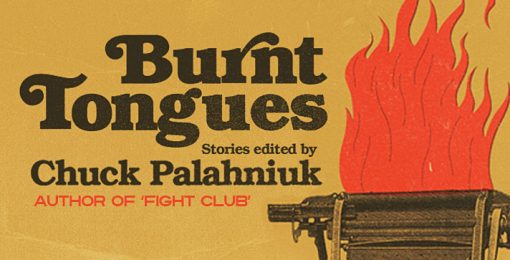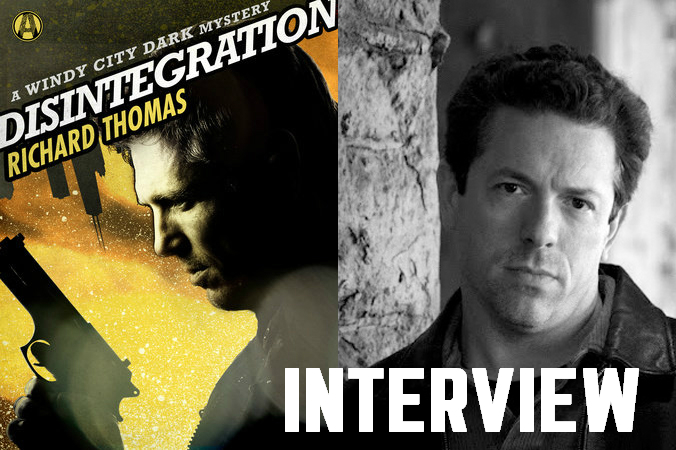Richard Thomas is a man who works hard. He runs the publishing house Dark House Press, edits anthologies with the likes of Chuck Palahniuk, on top of being one of the nicest and most supporting writers around. He has recently released his latest novel, Disintegration and stopped by to answer some questions.
Disintegration is a dark tale, for sure. Taking place in your home city of Chicago, a man loses his family and goes into the deep end. As a family man yourself, was this book an exorcism of your worst fears, and how did you know when to stop and when to keep pushing into the pain you could only imagine?
Great question. Yes, this book is the direct result of a class I took with Jack Ketchum, where he talked about addressing our worst fears. I followed the rabbit down the hole as deep as it went. I wasn’t sure where the bottom was, but there was a rape scene that appears later in the book, and that was a definining moment for my protagonist and myself. In the end, I dialed that scene back, and eventually rewrote it entirely under the advisement of my editor, Dana Isaacson, at Random House Alibi. It was a good call I think. This book was so intense that when I finished it, I broke down and cried, thought I might throw up. It upset me a great deal. But it has some hope, some redemption at the end, I think.
It’s the first in the shared universe followed by The Breaker later this year. Is this Chicago truly fiction, or is it the deep underlying darkness that exists in these cities that people don’t talk about?
I did try to get as much of the real Chicago into this novel as I could. I did live in Wicker Park for 12 years, and many of the places and even the people you see on the street are real. I’ve seen some dark things happen on the streets of Chicago, especially at night, violence and sex and surreal glimpses into the supernatural. That was part of what I wanted to explore, the monster inside us all.
Having had work published in hardback, paperback, digital only and more short stories published than I can count, how do you feel about the mediums available to you as a writer, based on your experiences?
I wish I could say I know what works, but it seems to be changing all the time. I am old school, I love holding a book in my hands, especially hardcovers. I like to touch the leatherbound, the gold-embossed, foil-stamped books. But I can also remember the first time I got an iPod, how cool it was to have all of that music at my fingertips, not having to lug around a box of tapes, or a ton of CDs. I think it’s changing, the way we read, but there will always be people that love holding a book in their hands, all of the little touches that make a print book appealing. I try to embrace them all, every medium, and often reprint stories so they can get to more readers.

Dark House Press, the imprint of Curbside Splendor that you run, also publishes dark fiction. Does the process of publishing ever have any influence on your own work?
Sure. I get to read a lot of great submissions, and short stories, especially. Working with Stephen Graham Jones on his collection, After the People Lights Have Gone Off, really forced me to closely examine his work, how his stories evolve and sink in the hooks. He’s really a master storyteller, and it was like getting a private lesson, reading those stories, where I looked at every plot point and comma, every narrative hook and resolution. Same thing with The New Black and Exigencies, I learned a lot reading those stories. I’m always looking for new voices, to inspire my work as well as to entertain myself, and there is so much going on these days, so many diverse, and evolving voices. It’s a very exciting time to be a writer, and a reader.
For this novel (and your writing in general) you’ve spoken about Will Christopher Baer and Bret Easton Ellis being influences, among others. Who would be the most surprising influence, for you, or who would you say influenced you so you learned not to write in a certain way that wouldn’t work for the novel?
People might be surprised by the literary influences that inform my writing. I can remember the first time I read Beloved by Toni Morrison, and wow, how dark it was, how emotional that story was. Haruki Murakami, and especially, The Wind-Up Bird Chronicle, really showed me how you can take the everyday life, those mundane details, and mix them with the surreal, the historical, the strange. I definitely can’t write like Cormac McCarthy or Chuck Palahniuk, but both influence me a lot, in a number of different ways, from dense setting, to plot choices, to lyrical language, to transgressive ideas.
You’ve mentioned that you have a short story collection, book of essays and another novel joining us soon. If time/money wasn’t an issue, what other forms of art would you focus on?
I’d love to get into television and film. My agent is talking to studios right now. I see how exciting True Detective was for the first season, and I’d love to be involved with something like that. Feature films of course, with the right director and cast, wow, that would just be a whole new experience for me, the ability to get to people that don’t read. If I could work with somebody like David Fincher, or Christopher Nolan, or David Lynch, that would be a dream come true.
One of the most interesting things in Disintegration, that is becoming more common in modern television shows, is the fact that good people can do bad things when pushed to. Do you think it is important to show someone with redeeming qualities and coming from a better place before being corrupted?
I do. I find it so much more interesting to see that conflict, that struggle. I don’t believe that anybody is born evil, I think they are a product of their family, their setting, and the choices they make. Sure, some DNA might be there already, but that descent, that collapse, and how they deal with it all, whether it’s to embrace the madness and violence, or to resist it, I find that fascinating. I know I’m capable of violence, and would go to great lengths to defend my family, to save them. If you start in a tough setting, where the outcome is more predictable, that’s not nearly as interesting to me. Whether we’re talking about Dexter or Hannibal, I think the human condition, the rules and laws we choose to follow (or disregard), that’s all compelling fiction.

Other than editing for Dark House Press, there have been anthologies such as Burnt Tongues, and The Line-Up. What is it about anthologies that you find enjoyable to work in as an editor?
Oh, so many things. I love supporting authors that deserve the attention, whether they’re just getting started, or have published ten books. When I see a great film or read a fantastic book, I want to share that with people, and have them experience it, too. I love short stories, because it’s a low risk way of finding new voices, to try out different things as a writer, and a reader. I also love that each anthology has a wide range of topics, voices, and settings. It’s so much fun to try on all of those skins, to walk around in those minds for a bit. Hopefully, if I’ve done my job right, and you dig my aesthetic, the anthology as a whole will be an exciting experience. I can’t expect every story to work for every reader, but when I find “my people” out there, I love that I can take them on these rollercoaster rides, and enlighten them, shock them, make them laugh and cry and cringe. It’s inspiring to me, and hopefully, to the audience, as well.
Also, this summer you’ve been doing lots of teaching. Do you find the social aspect and engaging with people enjoyable, or distracting from writing?
I love teaching and meeting all of my fellow writers. Does it take me away from my writing? Sure. But not so much that I can’t write, that’s on me to find the time. I love it when I see that lightbulb go off, the writer finally connecting some dots, that epiphany. I just got back from teaching at the University of Iowa, and it really made me happy to hear from my students that they were inspired by what we talked about in class, that they found out about other authors that are writing like them, or paths to success, or even that it’s okay to write dark stories. I want all writers to embrace their gifts and if I can be a part of that discovery, that journey, help them to put it all together, wow, I’m honored to play a small role in their development. I know that some of these authors are going to go out there and do well, just from reading the writing that I did in class. That’s exciting. Even if they are my competition, now.
With so many projects going on, as well as a personal life, too, how do you find the time to balance so many projects?
It’s tough. I’m saying NO more often these days. I try to not be on Facebook and Twitter so much. I may have to walk away from a few things soon, just not enough hours in the day. I try to prioritize, and unfortunately that means making hard decisions about what works for me. Sometimes that comes down to money, and sometimes it comes down to relationships, and sometimes it comes down to whatever I’m working on that excites me. When I’m involved with something, whether it’s a new short story, or running Dark House Press, or starting a new novel, I pour all of myself into that project.
Most of the time it works out, and the experience is a great one. But quite often it fails, sometimes my fault, sometimes not. I evaluate where I am all the time, every year, and have to decide what to go after next, what makes the most sense, and what is the most satisfying. I also make time for family and friends, that’s important to me, too. I will say that writing is the most fulfilling thing I’ve ever done. I’m fighting to be a full-time writer, but it’s not easy. Something big has to break, I’m not quite there yet. Maybe that will be film rights and a movie, maybe it’ll be a new book deal, maybe a story in an elite market, or some kind of nomination or award. I don’t know. Last year I didn’t travel much, this year, I’ve been up to Wisconsin twice, Texas, Oklahoma, University of Iowa, and soon, Transylvania. That’s all new to me, and I know some of these relationships will continue. The future? Not sure. The nice thing about being a writer is you can do it for a long time, as long as you can physically type, and mentally create, much later in life than some professions. I’m keeping my fingers crossed.
Disintegration is available now on Kindle from Random House Alibi. Be sure to check out this wonderful dark tale.
Some of the coverage you find on Cultured Vultures contains affiliate links, which provide us with small commissions based on purchases made from visiting our site.

